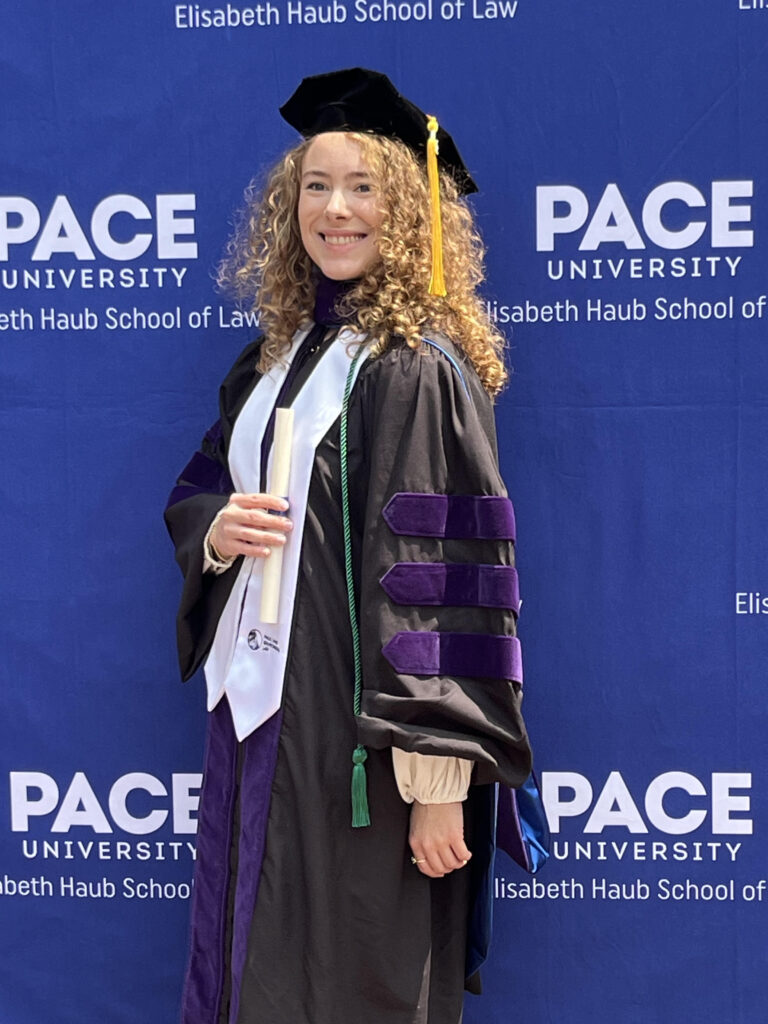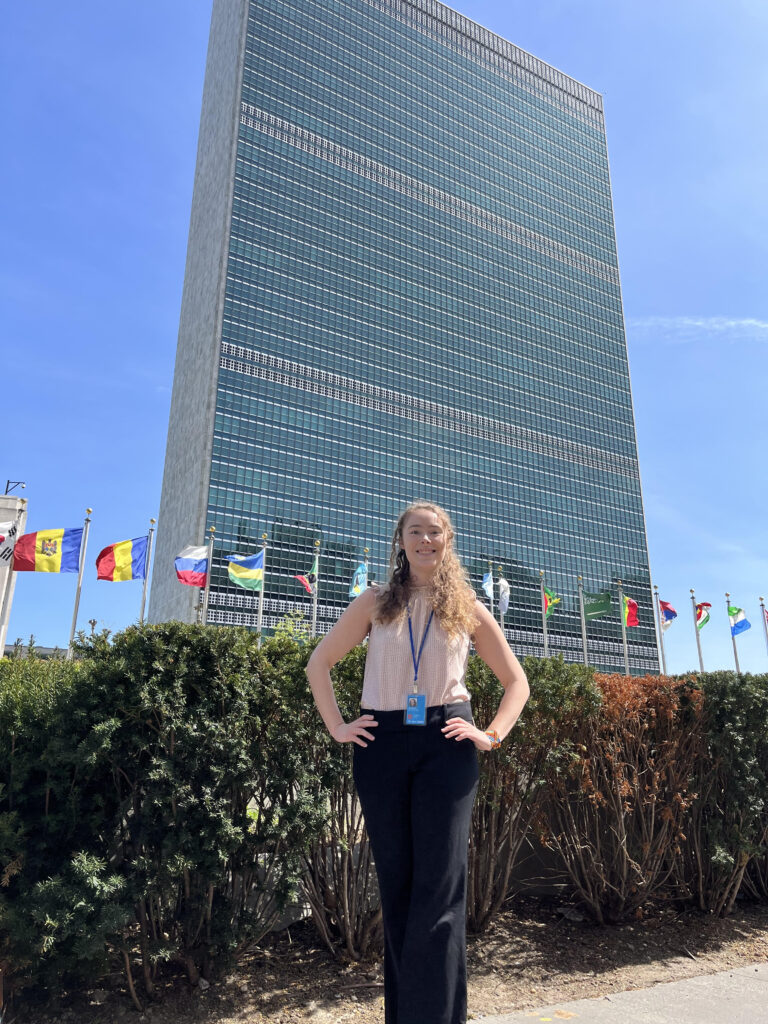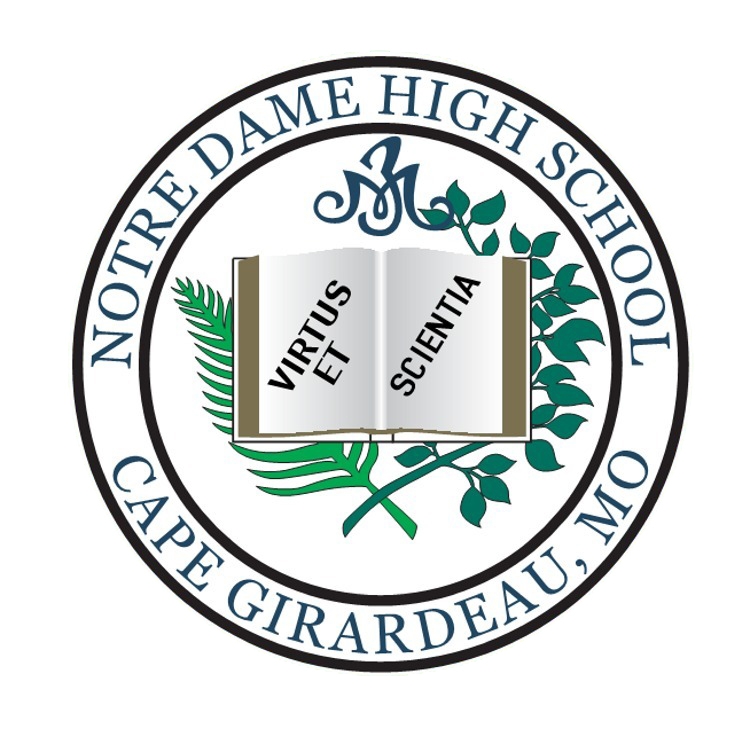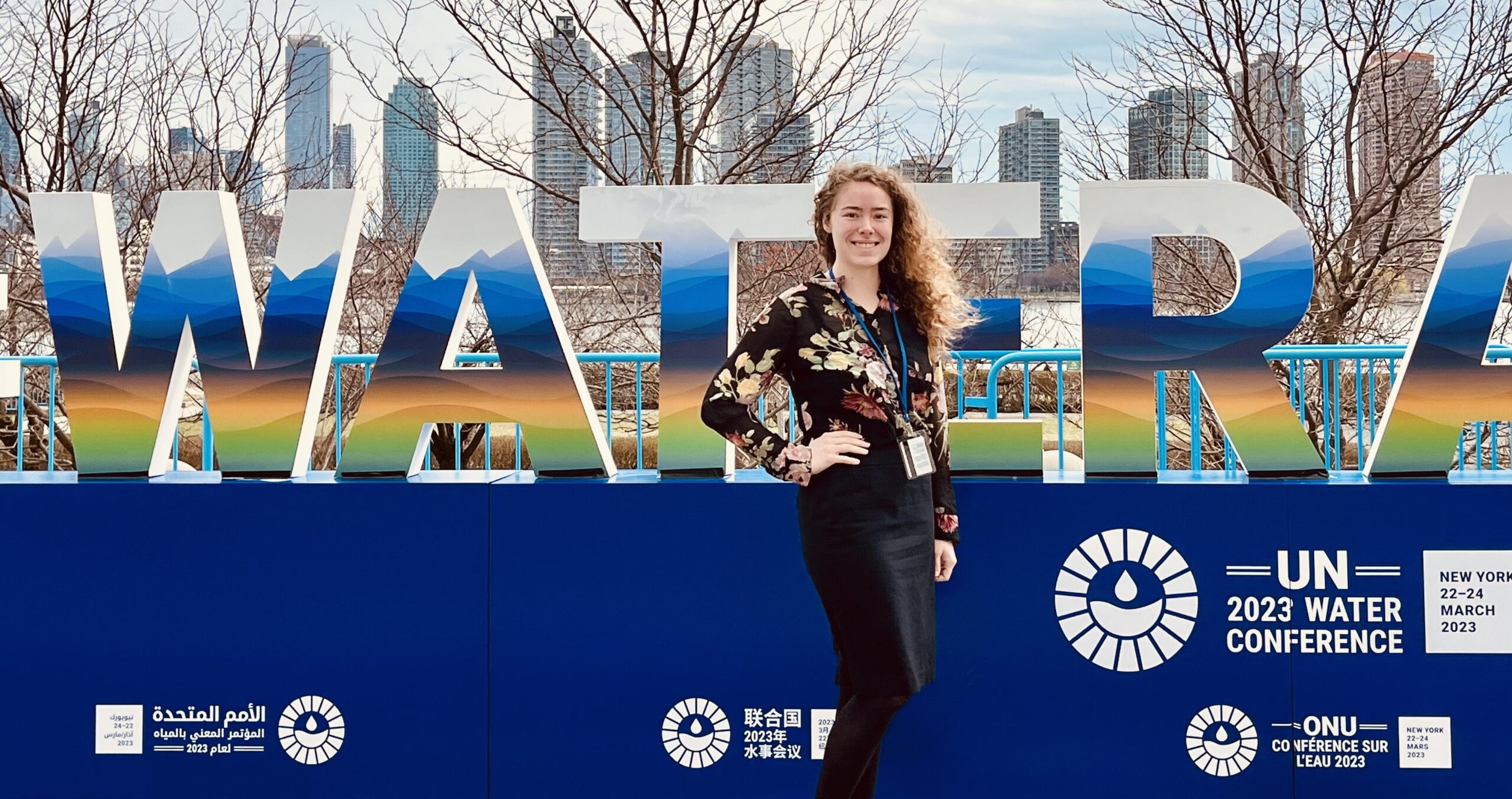Water rights, water access and climate change are tipping-point issues that spur Carly Hopkins to action, and now, she’s headed to the nation’s capital to work side by side with federal authorities to address them.
Hopkins Edges Out 250 Candidates for EPA Post
Hopkins, a 2016 Notre Dame Regional High School (NDHS) graduate, has accepted a two-year clerkship beginning in October 2023 with the Environmental Appeals Board (EAB) of the U.S. Environmental Protection Agency (EPA). The EAB is an appellate tribunal that hears administrative appeals under all major environmental statutes that the EPA administers, including a wide range of threats to the environment.
“I’m so honored I got it,” she said, after being tapped for the highly competitive post from some 250 candidates.
The Board consists of Environmental Appeals Judges and a staff of lawyers and administrative support who assist them. The Board’s primary duty is to resolve disputes between EPA offices and members of the public, private entities, or government entities under federal environmental laws.
Hopkins is ripe for the role. Her stellar resume is evidence of the work she has done over the past several years with domestic and international environmental policy makers at the highest level. Add her recent law degree to the mix, and she is a force to be reckoned with.
A Recently Hooded Pace University Law Graduate
The Marion, Illinois native graduated this month from the Elisabeth Haub School of Law at Pace University in White Plains, New York, where she earned a Juris Doctor with an Advanced Certificate in Environmental Law. Pace is ranked as the nation’s top environmental law program by U.S. News & World Report, which spurred Hopkins to venture east after completing her undergraduate studies at the University of Illinois Urbana-Champaign.
“I never thought I’d end up in New York,” she said, but “I’ve had incredible experiences that I wouldn’t have had otherwise.”
That, she has. Her out-of-the-classroom internships have been nothing short of phenomenal.
Earlier this year, a Pace faculty member nominated Hopkins to attend the Normandy Chair for Peace Summer School in France where peace, the environment, and rights for future generations were examined by law and science students and activists from all over the world, including the United States, Pakistan, India and Australia. Hopkins called it “a weeklong informational training camp on international environmental policy.”
Because many Pace Law professors “are huge in this space and known internationally,” Hopkins said, she was afforded this tremendous opportunity.
“I learned a lot,” she said.
UN Work Tops Hopkins’ Out-of-Classroom Experiences
She followed that up by participating in the United Nations (UN) 2023 Water Conference in March in New York City, where critical water issues were being examined to sustain the health and prosperity of people and the planet. The International Union for Conservation of Nature (IUCN), where Hopkins has served as a legal intern in New York City over the past year, participated in the Water Conference. Her duties with IUCN have called on her to research international environmental topics such as renewable energy transitions across the globe, and attend meetings on topics ranging from the UN administrative process to global efforts to mitigate climate change impacts.

Hopkins graduated from PACE University Law School on Monday, May 15, 2023.
Through a partnership with Pace Law School, the IUCN offers law students internship opportunities to attend General Assembly meetings, informal consultations and events at the UN. The IUCN is an observer of the UN and an international organization focused on biodiversity, climate change, freshwater and water security, environmental law, protected areas, social and economic policy, ecosystem management, and education and communication.
“Being in the room where it happens” in the United Nations has been incredible, Hopkins says. “We are amending the international law of the oceans and the seas right now.”
Exposure to global environmental topics and discussions has broadened her lens on the world and on the policy makers at the center of these issues. She illustrates her point, mentioning the heightened tensions she has witnessed in the room between representatives of Ukraine and Russia, circumstances that have taught her the importance of stepping lightly and “being careful and on your toes,” she said.
“Seeing all these countries coming together … it’s extraordinary,” she said.
“It’s an incredible honor to be able to work there. The United Nations has expanded my horizons” and, she said, helped pique her interest in international environmental law. “There’s so much world to see and so many people to meet.”
In addition to her work with the IUCN, Hopkins has been a Climate Action Committee Volunteer for the past two and a half years with the Global Center for Environmental Legal Studies in White Plains, New York. In this role, she has advocated for motions to IUCN registered voters to be considered at the World Conservation Congress, which is held every four years, and brings together 1400-plus government, civil society and indigenous peoples’ Member organizations from over 160 countries. She also supports efforts to make climate change integral to the organization’s mission.
The highlight of her work with the Global Center for Environmental Legal Studies, Hopkins said, was the passage of an amendment she helped write to a motion presented at the World Conservation Congress. The amendment called for advancing climate change by adding a reference to nature-based solutions and eliminating the use of fossil fuels. Passage of the amendment was significant, she said, because “any energy reference is very controversial.”
Additionally, she found time during the school year to serve as a Federal Judicial Honors Program Intern with Chief Judge Laura Taylor Swain of the U.S. District Court, SDNY.
“That was a really great experience,” Hopkins said, and provided her with a glimpse into a non-environmental role.
Hopkins also was a Climate, Air and Energy Intern last summer with the New York State Department of Environmental Conservation (DEC) in Albany. This experience paved the way for her to research the application of federal and state law on environmental issues, including the Clean Water Act, Clean Air Act, Federal Aviation Act, Equal Protection Clause, New York’s Climate Leadership and Community Protection Act, and the New York Environmental Conservation Law.
This followed her previous summer experience as a Legal Intern with former New York State Sen. Todd Kaminsky.
“It was great to see the legislative process” up close, she said of her experience in his office, adding it helped her understanding of “what goes in to getting a bill passed. It helped my research skills” too.
“I’ve now had experience in all three branches of government,” Hopkins said.
It has been a whirlwind three years in New York for Hopkins, who recently handed the reins of the Pace Environmental Law Review to her successors after serving this past year as co-research and writing editor. The previous year, she was the Law Review’s junior associate.
One experience has built upon another, she said, and the compilation of them has reinforced her long-term goals she began formulating several years ago.
UIUC Years Set the Tone
Hopkins graduated with high honors in a virtual ceremony in 2020 in the height of the COVID-19 pandemic from the University of Illinois Urbana-Champaign where she earned a Bachelor of Science in Natural Resources and Environmental Sciences with an environmental law/economics minor. There, she was a James Scholar in the College of Agricultural, Consumer and Environmental Sciences (ACES), where she served as a student intern in the Office of the Dean. During her undergraduate studies, she took a class in environmental law and environmental policy that reinforced her decision to pursue law school.
“It was very fascinating to learn how our world is structured and the laws that are behind everything around us,” she said.
During her undergraduate years, she began testing the waters to determine which aspect of environmental science was most appealing. For two years, she served as a research assistant with Miller Research Group in Urbana, Illinois, examining data from case studies for inclusion in a map of evidence on the socio-economic and ecological impacts of agroforestry in high-income countries. She also was environmental director, environmental coordinator and member of Volunteer Illini Projects in Urbana, collaborating on projects and events with area park districts and campus organizations, and hosting annual Earth Day events.
She also spent the summers of 2018 and 2019 respectively as an environmental education intern with the Touch of Nature Environmental Center in Makanda, Illinois, and the National Great Rivers Research and Education Center at Missouri River Relief in Columbia, Missouri. In Makanda, she designed environmental education boards for on-site buildings and developed an interpretive hiking guide on southern Illinois’ history, geology, fauna and flora for group leaders to use. In Columbia, she helped write lesson plans about the Missouri River for fourth graders in the Columbia Public School District.
A Lifelong Yearning for Environmental Science
Hopkins has always been interested in environmental science. Her native home in Marion, Illinois in Williamson County “was founded on coal mining,” she said. Growing up in that area, she became aware of its history and the effects of environmental pollution. Hopkins enjoyed outdoor recreation with her family and friends, and was a frequent hiker in the Shawnee National Forest and in Giant City State Park in her southern Illinois backyard.
“I carved my own way,” she said.
NDHS ‘Amazing Academics’ Set the Foundation
A graduate of Our Lady of Mt. Carmel School in Herrin, Illinois, Hopkins decided to attend Notre Dame Regional High School because of its “amazing academics.” There was also no other Catholic high school closer to home.
Families for the Advancement of Catholic Education (FACE) came together to operate a van to transport southern Illinois students to NDHS, and Hopkins was one of five who made the three-hour round-trip trek every day. Soon, the number of southern Illinois students attending NDHS would grow, and by Hopkins’ senior year, a bus had been acquired to transport the blossoming group.
“You had to learn time management at Notre Dame to drive that far every day,” said Hopkins, who also found a way to play varsity tennis for four years, play flute in the Pep Band, and serve as president of the Recycling Club.
The drive was well worth it, she said. “I knew at Notre Dame I was learning what I needed to get into college. All my success is built on everyone there” who she calls “inspirational.”
“It’s not only what I learned, but the work ethic was even more important,” she stressed.
She credits two NDHS faculty members who were especially influential – Mrs. Angela Schaefer, head of the Science Department, and Mr. Doug Dirnberger, head of Art.
The knowledge Hopkins gained in Schaefer’s classes in chemistry, she said, “saved me during my freshmen and sophomore years” in chemistry at the University of Illinois, where she saw other Illinois classmates struggling with course content.
“It was definitely hard, but it paid off,” Hopkins said of Schaefer’s classes.
And she carries Dirnberger’s lessons with her every day.

Hopkins outside the United Nations building in New York City, NY.
“It pays to be creative,” she said, adding that strong preparation in a variety of disciplines, including both science and English, have provided her with a firm foundation. “I’m so grateful for everybody there. … I’m really happy I went to Notre Dame.”
Eyeing Her Future in the Nation’s Capital
As Hopkins reminisces about her high school days, she now looks towards her future. The daughter of Teresa Machicao-Hopkins and James Hopkins, attorneys who together operate the Marion family law firm Machicao & Associates, Carly is planning to take the bar exam in July. She is looking forward to her move to the EPA in Washington, DC, where she envisions herself working in governmental roles for the foreseeable future.
“It would be cool to draft federal statutes,” she says.
After much exploration, Hopkins says she has landed on policy and law as her areas of greatest career interest.
“My skills lie there, and it’s where I think I can make the biggest impact.”



